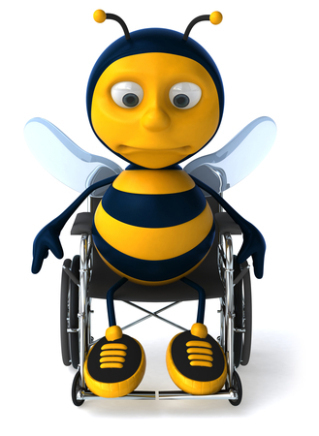Role Reversal: Tutoring Nadine on Welfare Island, 1970
Nadine could count but even the simplest addition or subtraction baffled her. She had a clear grasp of money and knew down to the nickel what she could buy with it in the hospital cafeteria and from the vending machines. She always had a soda and a snack on the meal tray and several times interrupted our hour-long lesson to replenish her supply. One day as I arrived I saw her head towards her room and expertly maneuver her wheelchair around the corner, a small pile of goodies in her lap: a shrink-wrapped Danish, two packs of gum and a candy bar. She glanced up to see me and did not look happy. I was an unwelcome interruption to the sugar orgy she had planned. Maybe I could get her to figure out how much money was left after this little binge without laying it all out on her tray and counting. But I wasn’t hopeful. We’d been over it three or four times already.
“Hi, Nadine. How’re you doing today? Where’s your roommate?”
I sometimes wondered if her lack of progress was simple embarrassment at having to learn in front of another person. She never complained and the few exchanges I heard between them were friendly and relaxed, but still. It couldn’t be easy admitting that such a basic skill was beyond you. At first, when the roommate was there I did my best to keep my voice low, but Nadine never did, so I stopped.
“She’s having a procedure. But I have something big to tell you!” she said, ripping open the Danish. She held it toward me. “Want some?”
“No, thanks. But tell me the gossip after we’ve done a little work, ok?”
She sighed, and I reminded myself that she signed up for this; she wasn’t being forced. She wanted to pass her GED and insisted that the one thing holding her back was basic arithmetic. In her mid-twenties, and having lived in a hospital nearly all her life, her education was more limited than in anyone else I’d ever spent time with. She could read and write and count. That was it as far as academic skills went.
Her social skills, however, were spectacular. By the end of the five weeks I tutored her and she gave up on the GED, Nadine had reversed our roles completely: she taught me about life in a hospital, especially for those like her, confined to a wheelchair. It was a revelation.
“One of the girls is pregnant, and she’s afraid to tell her mother.”
While I understood her fear, I was more amazed at the girl’s ability to get pregnant than worried about her mother’s reaction. All the girls in her ward had either been born with paraplegia or quadriplegia. They all used, as expertly as Nadine in most cases, wheelchairs.
“What do you mean pregnant? By whom?”
“Her boyfriend, who else?”
I was eighteen and had no dating or sex life to speak of. Two years earlier at Nazareth High School, I’d taken a girl to the senior prom. We’d had a single prior date just so it wouldn’t be a completely cold call when I invited her. To my astonishment, a junior came up to me in the cafeteria and asked my permission to invite her to the Junior Prom. I was pig-ignorant about the ways of dating and girlfriends and hadn’t learned any more since. At Brooklyn College I was still trying to be heterosexual and subjecting unsuspecting young women to my doomed experimentation, although their refusal to kiss me might indicate that I was the clueless one. Now I was learning that a girl who spent most of her waking hours in a wheelchair had more sex than I did. Astonishing.
“Where? How?”
“She’s been seeing this guy down the hall. They’ve been pretty steady for months now.”
I must have looked bewildered because Nadine explained the layout of the hospital to me. There was one corridor that wasn’t traveled heavily or that the hospital staff avoided—for reasons I now understood. At night, it became the patients’ lover’s lane. None of this fit with my initial impression of Goldwater Memorial Hospital, one of the few inhabited buildings on what was still called Welfare Island. Renamed in 1973, Roosevelt Island hadn’t yet become the desirable residential address it is today, with spectacular views of midtown Manhattan only a half-mile across the East River. Then it was a dismal place, especially in winter. The Tramway didn’t exist yet (it began operation in 1976). To get there we walked halfway across the 59th Street Bridge and came down a staircase inside one of the piers—the elevator that serviced the long-gone trolleys no longer worked. Sometimes the tower was closed and we had to go into Queens and then take a bus back to the island. Goldwater was just south of the bridge, a dismal brown brick building with dirty windows. Once inside it felt like a prison—the only bright spot for me was talking to Nadine.
“Well, good luck to them.” I still didn’t want to admit that I was more interested in hearing Nadine’s gossip than getting her over whatever mental block she had about addition and subtraction. I set down five pennies in a row and she counted them off proudly: “one, two, three, four, five!”
“Great. Now if I were to add five more in another line right beside them, how many would there be?”
“There would be five more.”
“Yes, and how many is that? Five pennies plus five pennies equals what?“
“Did I tell you that one of the girls is pregnant?”
“Yes, Nadine. You just did.”
“But that’s not all . . . they’re going to elope.”
Having just learned and understood, albeit academically, that one of Nadine’s friends was now pregnant (I didn’t ask about the mechanics, only marveled at their determination and ingenuity), I gave up any pretense of teaching her to add and subtract and surrendered. I had to know more.
“How will they manage that?”
Nadine, triumphant and beaming—she had my complete attention and could forget about “stupid arithmetic” for the rest of the hour—stacked the coins, pushed them back to me, leaned over the table between us and grasped my forearms in both hands.
“We’re going on a day-trip next week and they’re going to sneak away.”
“But who will marry them? Where?”
“That’s all arranged. They have a friend who will drive them to the church and back. They’ve found someone who is willing to marry them. They’re both very happy.”
She smiled so fiercely you’d think she was the one getting married. I never asked about her own love life or her family. Given her love of gossip, I assumed that if she wanted to she’d tell me. The most she ever said was that her family visited often and she wished they were capable of caring for her at home. But hearing about the active social scene at the hospital, I hoped she was also participating. I don’t know if she thought of herself as pretty, but she was. Almond-shaped hazel eyes, a cute nose, thin, smooth red lips that reminded me of Vermeer’s Study of a Young Woman. With the same high forehead and dark hair pulled back tight against her head, she could have sat for it herself. I was certain someone would go for her.
We spent the rest of that hour, our next to last, discussing the various relationships Nadine kept track of. She had the material for an entertaining gossip column: she knew which patients had the hots for each other, which nurses could be trusted with a secret and which male nurse was the biggest flirt (but she assured me he was not the father of her friend’s baby). She disliked most of the doctors but was patient with the residents since “they have to learn somewhere.” She was the furthest thing from a defeated patient. When she zipped down the corridors and in and out of her friends’ rooms she was a Queen Bee, gathering information and sharing it where and when she chose, the juiciest grape on the vine. In any setting she would have been a success—and in this one was not letting limitations define her life. It was a lesson I needed as well.
I was not succeeding at anything. In the four years since getting kicked out of St. Joe’s, I’d vacillated between grandiose daydreams—writing bad imitations of T. S. Eliot
a thousand leafless trees
on a thousand solitary islands
and pretending to be a serious student and aspiring poet studying Greek, while actually going to the opera with standing room tickets even the night before final exams when I was supposed to be cramming and learning everything I hadn’t looked at all semester. My grades for the twenty-one courses listed on my transcript through the spring of 1970 were, in ascending order, 1 NG, 3 Ps, 6 Ds, 4 Cs, 4 Bs and 3 As (Intro Lit I/Personal Hygiene/Public Health and Required Swimming).
During the next week’s session Nadine told me it was our last. I didn’t try to dissuade her; arithmetic mattered less than the world she inhabited with enthusiasm and grace—and her employment prospects were not likely to change much even if she did get a GED. The first law protecting the disabled was three years away, when Section 504 of the 1973 Rehabilitation Act banned discrimination by “employers and organizations that receive financial assistance from any Federal department or agency.” Congress didn’t pass the comprehensive Americans with Disabilities Act, first introduced in 1988, until 1990, twenty years after I met Nadine. By then she would have been in her mid-forties.
So we talked of the ongoing elopement plans—still a secret kept by only Nadine and the conspiring couple, with me a privileged outsider who couldn’t disrupt anything even if I wanted to. I didn’t know their names or any details other than the few Nadine allowed into our conversations—I swear the woman would have made an excellent diplomat.
When we said good-bye I knew it was probably the last time I would ever see her. She didn’t have my home phone number and all communication had been between the hospital and Brooklyn College, which had arranged for the tutoring sessions through the Office of Student Activities.
But I thought of her often and was inspired by her example of grace under pressure. As winter turned to spring, I screwed up my courage and began exploring Manhattan’s gay nightlife, which now had some novel features. In late April I attended one of the monthly “First Friday” gay dances at Columbia University organized by the Student Homophile League, formed pre-Stonewall in 1967 and already three years old. By the end of the night, I’d met my first boyfriend, Michael. Three months later I left home for the second time to join the Gay Liberation Front, and met my first mentor, the drama critic Eric Bentley in a conscious-raising group. Michael and Eric quickly became two of the most important influences in my life for the next decade and beyond.






